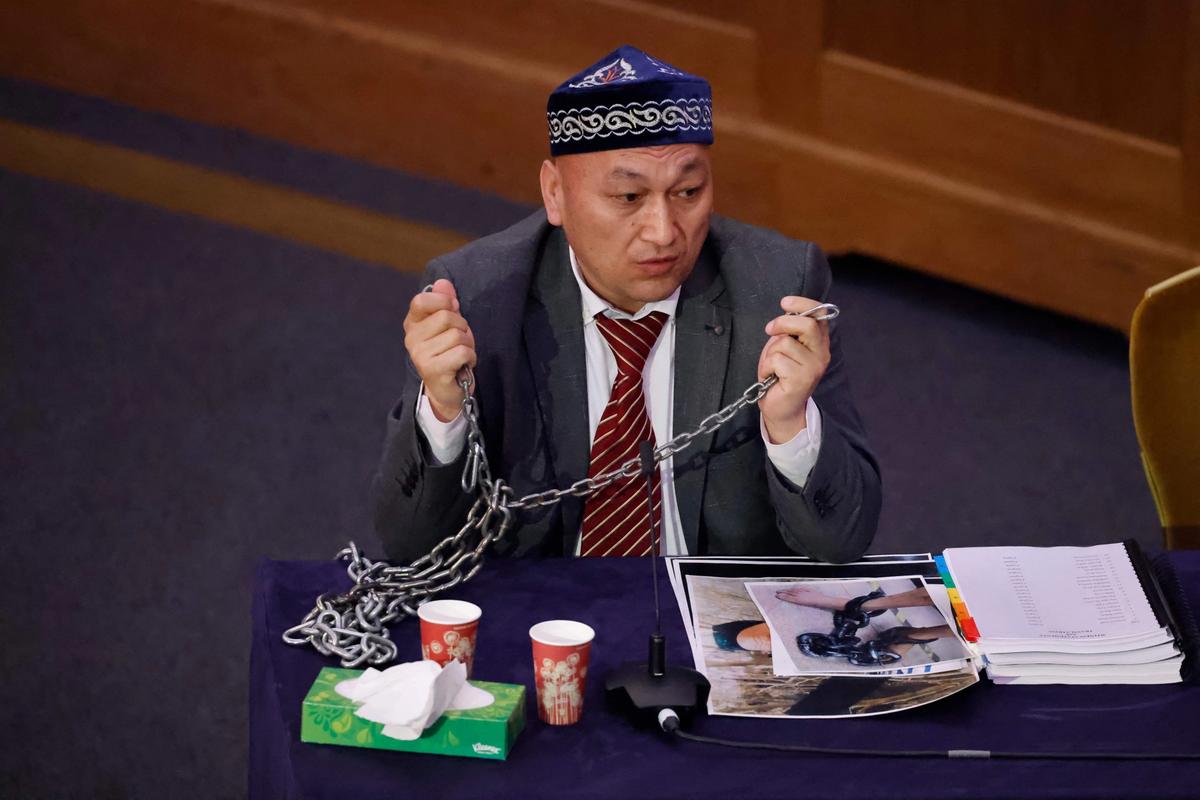Uyghur survivors of detention camps in the Xinjiang region of China have told a London tribunal that prisoners there are routinely raped, tortured and forcibly sterilised. Other detainees, mostly healthy men and women aged between 20 and 30, have disappeared in captivity and are presumed to have died after their organs were removed to service China’s lucrative black-market trade in transplant surgery, witnesses said. The violence against Uyghurs and other Muslim groups in Xinjiang has coincided with a draconian suppression of religious practice in the region and the destruction, defacement or closure of mosques, shrines, Muslim cemeteries and other sacred spaces, experts said.
From 4 to 7 June, the camp survivors gave evidence to the Uyghur Tribunal, an independent panel set up in London to investigate China’s alleged human rights abuses and possible crimes against humanity in the Xinjiang detention camps.
The nine-member tribunal is chaired by the British barrister Sir Geoffrey Nice who led the United Nations’ prosecution of the former Serbian President Slobodan Milošević at The Hague. It was convened at the request of the World Uyghur Congress, a group of Uyghurs living in exile.
“We all have duties in respect of the suffering of our fellow men”Sir Geoffrey Nice, chair of the Uyghur Tribunal
Although the panel has no power to sanction China, organisers believe that its work is critical. “If it were realistically possible to bring China to any formal international court, in particular to the International Court of Justice (ICJ)—there would be no need for the establishment of a people’s tribunal. There is no such possibility not least because China, although a signatory to and ratifier of the Genocide Convention, has entered a reservation against ICJ jurisdiction. There is no known route to any other court that can deal with the issues before the tribunal,” the organisation states on its website.
All evidence gathered by the tribunal, including written statements submitted by witnesses and video of over 40 hours of testimony from the four-day hearings in June, is publicly available on the organisation’s website. The objective is for governments, companies and institutions that deal with China, including museums, to review this evidence so it informs their decisions going forward, the tribunal states on its website.
Major British and European museums such as Tate and the Victoria & Albert Museum (V&A) in London and the Centre Pompidou in Paris are collaborating with State-owned firms in China to develop projects in the country and share their art collections and expertise. When questioned about partnering with the Chinese State, they argued that the alliances “help to foster tolerance” (Pompidou); “generate greater understanding between global cultures and communities” and “play an increasingly important part in ensuring the V&A is financially sustainable” (V&A), and help “increase Chinese people’s access to the possibilities of international art” (Tate). Both London museums declined to discuss the issue of Uyghur suppression while the Pompidou said it does not “intervene in international matters handled by the French government.”
[Disclosure: The Art Newspaper has an independent franchise in China, owned by Modern Media Group Holdings, which is listed on the Hong Kong stock exchange.]
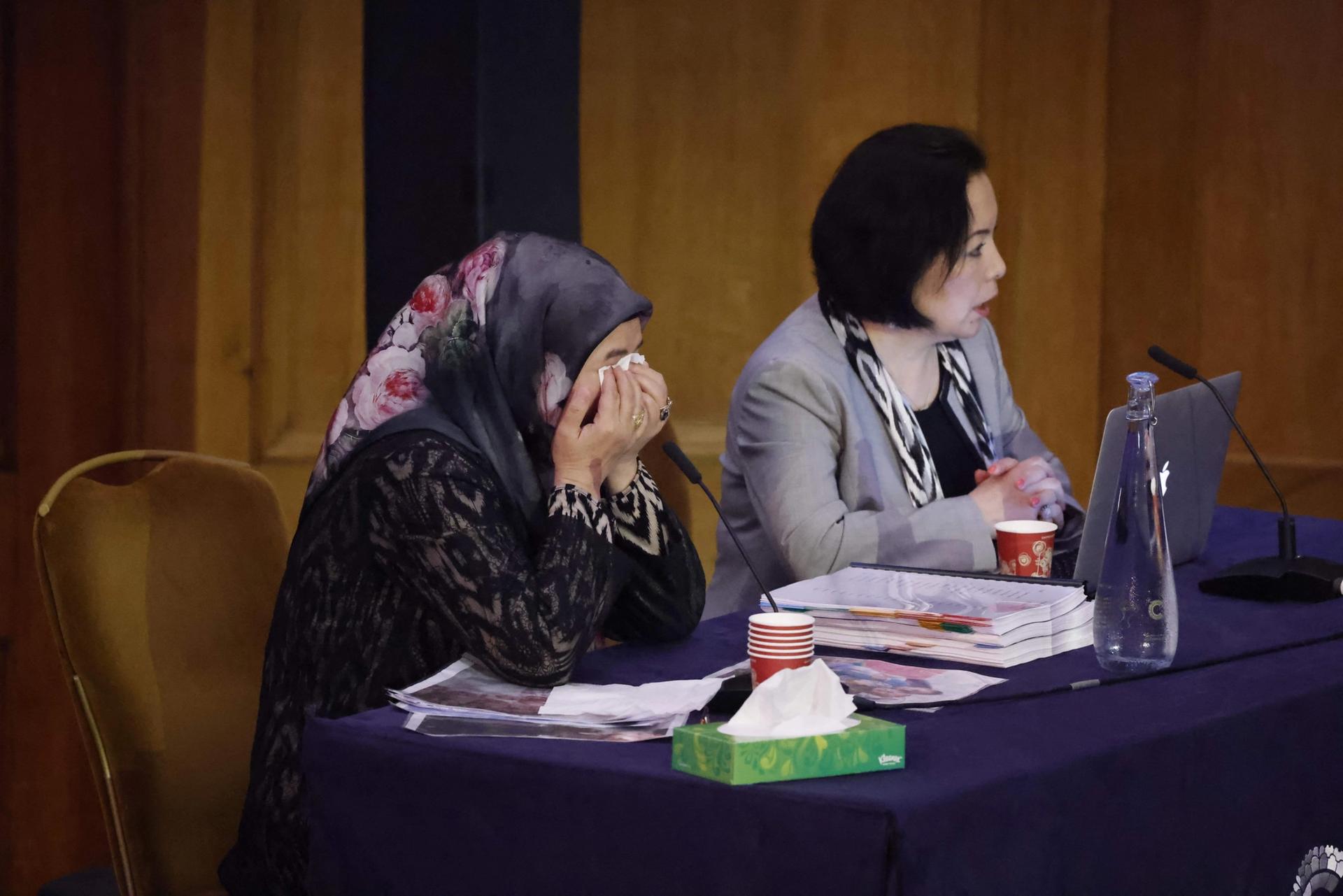
Witness Patigul Talip (left) breaks down as she speaks through an interpreter (right) on the first day of hearings at the Uyghur Tribunal Photo: Tolga Akmen / AFP via Getty Images
The Art Newspaper attended the Uyghur Tribunal hearings and presents some of the main testimony here. This is harrowing and shocking. As well as testimonies from camp survivors, the hearings also included evidence from teachers sent into the camps to help “re-educate” detainees; from a former Xinjiang police officer now living in asylum in Europe, and from numerous international experts in Chinese policy.
The tribunal heard that violence against Uyghurs, Kazakhs and other Turkic Muslim groups in Xinjiang is part of a concerted attempt to reduce the numbers of these minority populations, wipe out their culture and assimilate and control them. Mosques, shrines, cemeteries and other sacred spaces have been destroyed throughout the region, and all cultural and religious expressions of Muslim identity, such as travelling to Mecca for the Hajj, refusing to eat pork when it is offered by Chinese officials and even growing a beard or moustache, are, in effect, now punishable with internment in a detention camp, experts and witnesses said.
The detention camps have the capacity to hold up to one million people at any one time, Nathan Ruser, an expert in satellite data and open-source intelligence at the Australian Strategic Policy Institute, told the tribunal. Using satellite imagery, ASPI has identified 380 prison complexes in Xinjiang. These have all been built or expanded since 2017, after the appointment of Chen Quanguo as CCP Regional Party Secretary in Xinjiang. Chen has presided over a policy of mass internment for Uyghurs and other Muslims in the region, purportedly as part of anti-radicalisation policies, and ramped up surveillance of minority ethnic groups.
An estimated 500,000 Uyghur children, aged 0-5, have been removed from their families after their parents were detained and are now being raised in State-run “kindness centres” where all teaching is in Mandarin. The policy amounts to a “forcible transfer of children from one ethnicity to another,” Darren Byler, a post-doctoral researcher at the University of Colorado, said as part of his testimony on forced assimilation in Xinjiang.
Wiping out Uyghur and Muslim culture
Jo Smith Finley, a reader in Chinese studies at Newcastle University who has conducted field work in Xinjiang for nearly 30 years, presented the findings of two recent trips to the region in which she documented a crackdown on religious practice and the destruction or defacement of mosques, graveyards and other cultural symbols.
She visited mosques in the capital Urumqi and in the southern city of Kashgar and found that most of them were locked up and deserted. Some are surrounded by barbed wire and have had security check points with iris scanners installed at their entrances. In Kashgar, one large mosque has been turned into a museum; others have been converted into cafes and bars and “are now frequented by Han Chinese tourists drinking beer”, Smith Finley said.
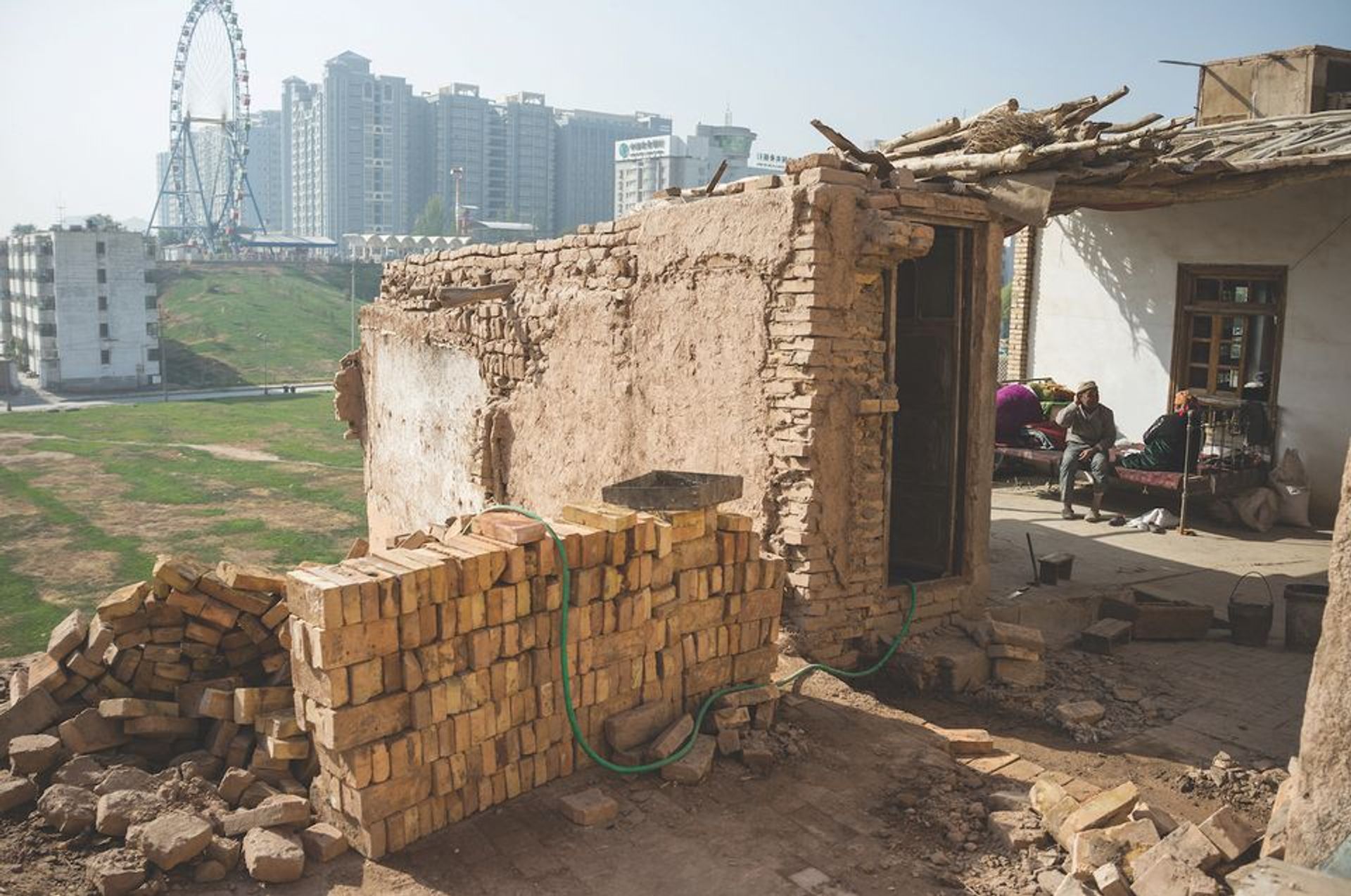
Kashgar’s old city has been demolished, along with 70% of its mosques, and its population displaced @ 2012 Wulingyun
The Uyghurs she spoke to during her trips all said they are now too afraid to visit mosques for prayer or to display any outward symbol of Muslim identity because the mass internment campaign has targeted anyone observing “everyday, ordinary, peaceful religious practices,” Smith Finley said.
Reasons cited by Smith Finley for detention in a prison camp include “praying regularly”; “reciting an Islamic verse at a funeral”; “giving children names of Islamic origin”; “asking an imam to name your children”; “teaching the Qur’an to your children”, “attending mosque”; “possessing illegal religious content, such as Islamic verses, on mobile phones”; “washing bodies according to Islamic custom”, and “wearing the niqab or hijab.”
If you are detained, you may not survive the experience. “Everyone [I spoke to] said that very few people are coming out of the camps,” Smith Finley said.
“The aim is to eradicate the Uyghurs as a separate ethnic group,” Smith Finley told the tribunal, noting that co-erced inter-marriages between Uyghur women and Han Chinese men are now widespread. What we are witnessing is “an absolute empyting out of Uyghur linguistic, religious, and cultural identity…[so that only the] physical shell of a people is left without cultural substance, deprived of their ability to transmit their cultural life force from one generation to the next.”
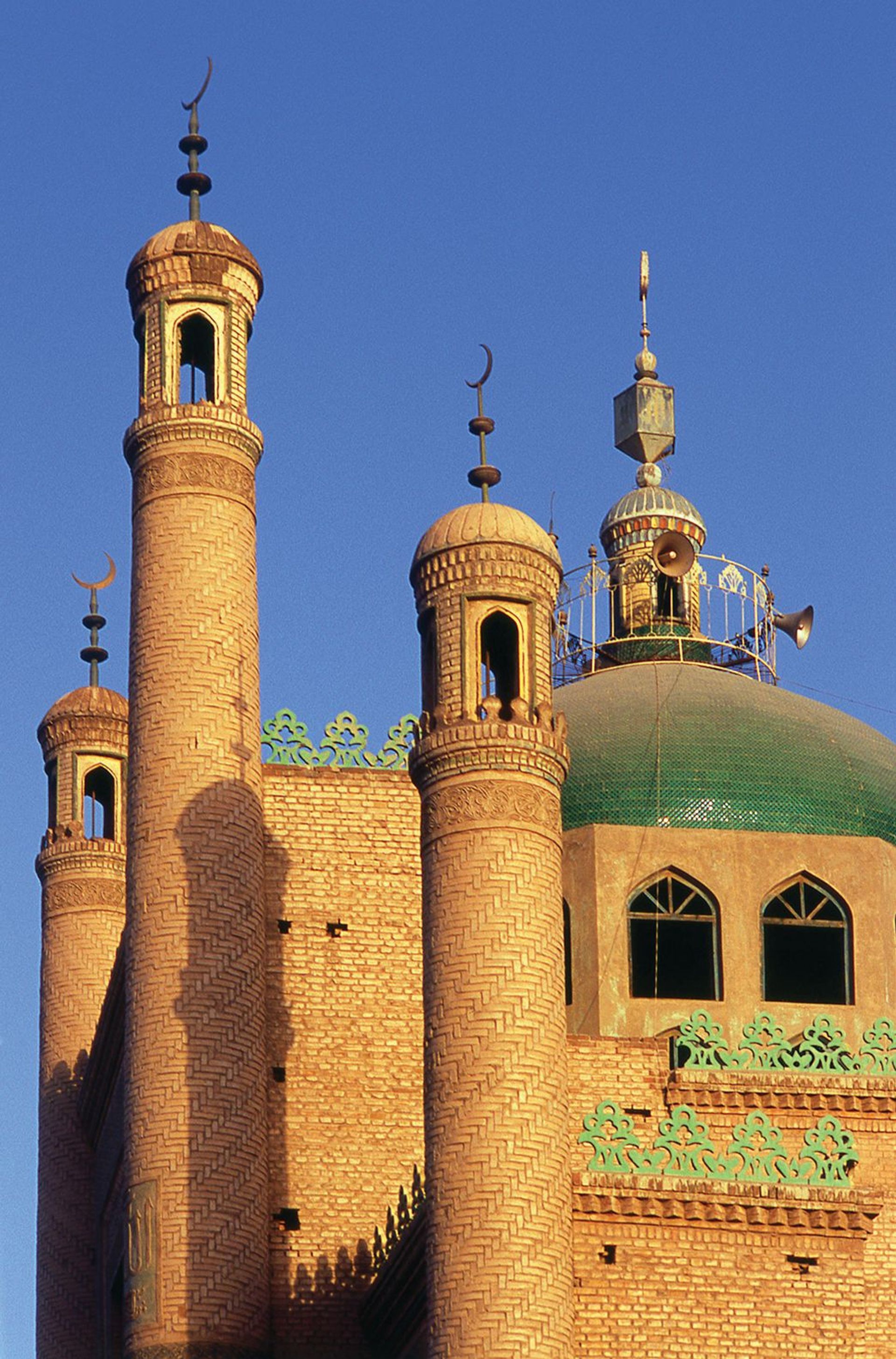
The Grand Mosque of Kargilik still stands but its ancillary buildings, including its impressive gatehouse, were demolished to make room for a mall Photo: CPA Media Pte Ltd
A recent report by the Australian Strategic Policy Institute (ASPI) found that since 2017, 56% of the region’s mosques and 58% of its important Islamic sites have been either destroyed or damaged. Nathan Ruser of ASPI told the tribunal that since publishing their findings on Xinjiang, much of the open source material they drew on such as Chinese construction tenders and documents relating to government labour programmes has been scrubbed from the internet, which will make it much more difficult to monitor the region in the future.
Adrian Zenz, an anthropologist who has studied the Xinjiang detention camps, presented new research to the tribunal which reveals official Chinese policies to minimise minorities in the region and increase the size of the Han Chinese population. Zenz uncovered Xinjiang family planning documents which show that by 2022, China aims to resettle 300,000 Han Chinese migrants in Xinjiang by offering incentives such as free land and well-paid jobs. This migration, combined with widespread birth prevention policies for Uyghurs, are an effort “to totally and brutally integrate the Uyghurs,” Zenz said.
Rape, torture and sterilisation
Camp survivors described the brutal conditions inside the detention centres. First, all new detainees are medically examined. Abortions are performed on all pregnant women before they enter the prisons, witnesses said. Some told stories of eight-month-old babies being forcibly aborted. Once inside the detention centres, both women and men are injected with unknown substances or forced to take unknown pills; medication which is believed to be forcibly sterilising the Uyghur population. Multiple female witnesses told the tribunal that women stopped menstruating after these drugs were administered.
Cells are hugely overcrowded and prisoners sleep on cement floors. One witness described being held with 40 women in a cell with no toilet, “the smell was unbearable,” she said. Food is scarce and witnesses told the tribunal that some prisoners starve. Rape and torture are routine, witnesses said.
Qelbinur Sidik, 51, a Uyghur from Urumqi, worked as a Chinese language teacher in the city for 28 years before being sent into the detention camps as a teacher in 2017. In a written statement submitted to the tribunal she said that male prison officers “take girls into the investigation rooms where there’s no camera, and 4-5 police officers rape one girl, one after another. After raping, they take electric rods and stick it into their vagina and rectum to torture, and rape again after.” Afterwards, these women and girls would struggle to sit through hours-long classes “because their body hurt after the beating and raping,” Sidik said.
Male survivors told the tribunal of “black rooms” inside detention camps filled with torture equipment such as steel chairs and electric prods. Some said prison guards had inserted electric wires into their penises. Others said they were made to stand in underground “water rooms” in cold water up to their necks. Many survivors, both men and women, said that finger nails are routinely pulled out of prisoners.
The organ trade
Gulbahar Jelilova, 57, a Uyghur citizen of Kazakhstan who was arrested by Chinese police in May 2017 when she travelled to the city of Urumqi, Xinjiang, on routine business for her clothing company, told the tribunal that she was kept shackled in a cell for 15 months and ended up in hospital four times after rape, torture and severe beatings. On one of these occasions, in the bed next to hers was “a 25-year-old girl; every two hours someone would take her urine and clean her catheter. I was told this was because her kidney [had been] removed,” Jelilova said in a written statement submitted to the tribunal.
Ethan Gutmann, an award-winning China analyst who has researched transplant abuse in the country for nearly two decades, told the tribunal that satellite images show crematoriums built close to prison camps so that bodies can be burned after operations to remove organs. He estimates that between 25,000 and 50,000 Uyghurs are being killed for their organs every year and that this is “overwhelming crematoria facilities near camps,” Gutmann said.
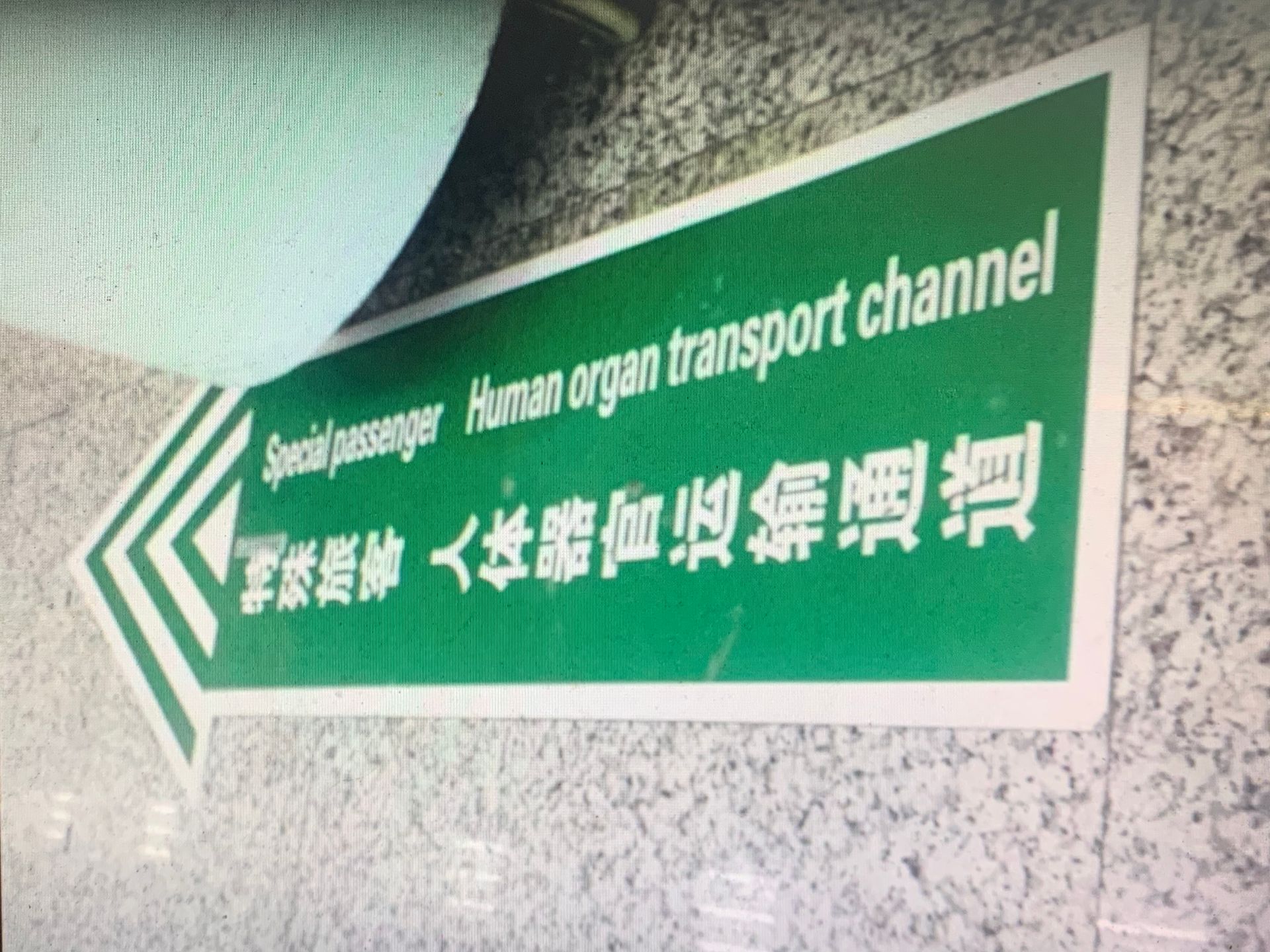
Airports in Xinjiang have set up special priority “green lanes” for medical teams transporting organs
He also provided a price list for prisoner organs: hearts are priced at $200,000, lungs cost $150,000, livers are $100,000-$150,000, a kidney is $50,000, and corneas cost $15,000. Each Uyghur body can net the Chinese State between $500,000 and $700,000, Gutmann told the tribunal.
“The main thing China offers is speed. There are cases of people in acute liver failure who travel to China for a transplant and are able to get one in just four hours,” he said, noting that airports in Xinjiang have set up special “green” lanes for doctors and medical teams to pass quickly through airports with organs. He also noted that the rape, torture of limbs and genitals that is widespread in the camps, inflicts great pain on prisoners but keeps their internal organs intact.
Several camp survivors told the tribunal that blood is regularly taken from prisoners; Gutmann suggests these blood tests are undertaken to match prisoners to “transplant tourists” who have travelled to China. One camp survivor told the tribunal that China is offering a “Halal organ service” to rich Muslim clients around the world. Gutmann says “transplant tourists” in China are known to come from the Emirates, Japan, Germany and the United States, among other countries.
The tribunal’s purpose
In an interview with BBC radio after the conclusion of the four-day hearings, the tribunal’s chair, Sir Geoffrey, said its value is in “providing facts to governments like ours that are extremely reluctant to make adverse findings about China and also to other governments, and to institutions of all kinds that interact with China. Providing a nugget of undoubted truth should oblige everyone to act in accordance with their duties. We all have duties, not just governments, we all have duties in respect of the suffering of our fellow men.”
The Uyghur Tribunal will hold a second set of hearings in September and expects to publish its final report in December.
Chinese response
The Chinese embassy in London dismissed the Uyghur Tribunal as an “anti-China farce” organised by “people with ulterior motives” which has no legal jurisdiction over China. It said that the witnesses who testified at the hearings are “individuals who make a living out of demonising China” or “actors who have been found to be habitually fabricating all sorts of ‘persecution’ stories that never happened”. It also says that some of the international experts who testified “have long been spreading lies about Xinjiang” and that the tribunal’s chair, Sir Geoffrey Nice, “used to be a British agent”. It concludes: “The residents of all ethnic groups in Xinjiang are leading happy and fulfilling lives.”


